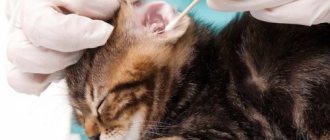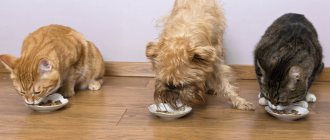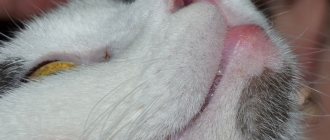Halitosis is the appearance of an unpleasant odor from the mouth, a fairly common reason for cat owners to visit a veterinarian.
The reason for the appearance of a repulsive odor from the mouth can be various factors - from diseases of the oral cavity to damage to internal organs. The smell emerging from the pet’s mouth can have a different hue - ammonia, ichorous, putrefactive, depending on the provoking factors.
The main causes of the problem:
- Changing teeth;
- Feed;
- Bone or thread;
- Viruses;
- Tartar;
- Diseases;
- Tumor;
- Systemic diseases;
- Poor oral hygiene.
These are the main options, but there may be other reasons associated with diseases of the internal organs. Now let's look at the details of each of them.
© shutterstock
Diseases of teeth and gums
One of the most common reasons for the appearance of an unpleasant odor from the mouth of an animal is diseases of the teeth and gums. In the absence of proper oral hygiene in a cat, pathological changes occur. A faint smell of raw fish begins to come from your pet’s mouth. This is the first signal for the owner. It is recommended to seek help from a veterinarian.
Pathologies such as tartar and inflammatory processes in the gum area and nearby tissues negatively affect the condition of the mucous membranes of the oral cavity and teeth.
Feed or spoiled food
Pets love to explore the kitchen and trash can for food. As a result, the cat may find the remains of old sausage or fish there. This situation can not only cause a terrible smell, but also provoke other diseases . In addition, missing food can cause a number of other serious problems. Therefore, carefully remove spoiled food. Sometimes low-quality prepared dry food can also cause an unpleasant odor.
Veterinarians recommend feeding the animal the same food and not constantly changing manufacturers. Also choose the optimal food in terms of price/quality ratio. If you combine different foods, an imbalance in the diet occurs.
About cat smell
A healthy and well-groomed cat does not have a pronounced, specific odor. What is commonly called “cat spirit” is the smell of urine - pungent and occurring in the absence of regular cleaning of the room and compliance with hygiene standards. Here the culprit can be considered not the cat itself, but its owner.
If an unpleasant odor begins to emanate directly from an animal that is being monitored and properly cared for, then the reason most likely lies in certain diseases characteristic of representatives of the cat family.
The cat is a hunter, a predator by nature. Therefore, these animals are extremely clean and ensure that there are no foreign odors.
An unpleasant odor should not occur even when your pet's fur gets wet.
Salivary glands
In the mouth, saliva constantly coats the mucous membrane, thereby protecting it from damage. During the eating period, more saliva is produced in order to safely swallow food. If there is little saliva, then injuries may occur when eating.
If there is little saliva, then dry food will injure the gums and tongue, which will lead to inflammation. If, on the contrary, there is an excess of saliva, the chin will begin to become inflamed in those places where saliva will constantly flow from the baby’s mouth. All this will lead to the development of microorganisms and the kitten’s breath may stink.
Why does my cat's breath smell like rotten meat?
I would like to immediately reassure cat owners who are concerned about the bad breath of their cat, your cat is absolutely healthy. And the unpleasant smell is due to the fact that the diet of the cat breed is almost 100% meat and fish products. Yes, it is rare to meet a vegetarian cat. If there are any, it is either because the owners are poor or because the cat is homeless and did not find any other food in the trash cans.
Why does my cat's breath smell like rotten meat? Meat and fish, entering the cat’s stomach, are digested by gastric juices, but this process is long and the smell of hydrogen sulfide, or rotten eggs, appears due to the breakdown of protein products. Should I worry about this if the cat is healthy and leads a normal life?
Signs of a healthy cat may include the following:
- The cat willingly eats regular food.
- The cat's fur is shiny and soft to the touch.
- He plays and readily responds to affection.
- The cat sleeps no more than usual.
All these signs do not apply to cats during the period of sexual heat. When a cat wants a cat or a cat wants a cat, you can forget about the adequacy of pets. If such a cat has the opportunity to go outside, then you can hardly wait for him to come home in the next three days. On active days, cats do not care about such little things as an empty and hungry stomach and matted, dirty fur.
If your cat is healthy, has a shiny coat, and eats willingly, bad cat breath can be considered normal.
Small infant kittens do not have bad breath. This is facilitated by feeding on milk from the mother cat.
Kittens smell better than adult cats
Lack of hygiene
Of course, kittens do not brush their teeth, and if they are fed properly and kept in clean conditions, this is not required. All you need is a preventive examination by a veterinarian from time to time. So that if a disease appears, it can be cured at the initial stage. It’s bad when the disease is in development.
© shutterstock
If an animal has an abnormal bite since birth and eats soft food, then it is recommended to brush its teeth.
Diseases of the gastrointestinal tract
Diseases of the digestive system can cause a repulsive odor from a cat’s mouth. Dysbacteriosis is a common factor that provokes the appearance of halitosis. The reason is the rapid growth and development of anaerobic opportunistic microorganisms.
Dysbacteriosis is an imbalance of microflora that occurs as a result of poor nutrition or a sharp decrease in the body’s immune forces.
If a cat has a strong smell of acetone from its mouth, this may indicate a problem with the pancreas. Carbohydrates stop being absorbed when there is a lack of insulin produced. Metabolism slows down, and toxic substances such as acetone and ketone bodies are formed from unbroken carbohydrates.
If you notice increased thirst in your pet combined with the smell of acetone from the mouth, it is recommended to visit a veterinary clinic as soon as possible. Symptoms may indicate the development of diabetes mellitus. The animal needs qualified help.
The occurrence of an unpleasant odor from a cat’s mouth may be due to the development of diseases of the gastrointestinal tract such as:
- gastritis;
- ulcerative damage to the walls of the stomach;
- tumor processes;
- intestinal obstruction;
- infectious pathologies.
Halitosis also occurs with serious helminthiasis. Infestation of the body by parasites requires immediate action on the part of the host. It is necessary to administer antihelminthic drugs twice in the correct dosage.
An unpleasant odor from the cat's mouth may be a sign of the development of liver disease. From the animal's mouth comes a sweetish, nauseating odor reminiscent of rotten flesh. The main filter organ neutralizes toxic substances and removes them. When the liver functions abnormally, toxins accumulate in the body, causing intoxication.
If you notice a sweetish odor reminiscent of rotten meat, a change in the shade of the visible mucous membranes and yellowness of the whites of the sclera, you should immediately seek help from a veterinarian.
The cat's breath stinks of rotten meat: disease prevention
Protecting domestic cats from fleas and worms is the prevention of many diseases. Even if your pet does not leave the apartment, periodically check its fur for fleas. If the cat goes outside freely, use flea collars or drops. Worms can appear in cats from contact with other animals, contact with contaminated food or soil. Why is infection with worms dangerous? By multiplying in large numbers in the body, worms can cause inflammation of the cat’s intestines, the smell of rotten meat from the cat’s mouth, intestinal blockage and even the death of the pet.
It is important to prevent infection with worms by deworming regularly every three months. Every veterinary pharmacy will offer you affordable deworming products for cats.
Fleas, especially during infancy, can cause poor growth and poor appetite in kittens. Sometimes, the health of infected kittens is so poor that their lives are in danger. Small kittens can be washed with flea shampoo; aggressive flea products should not be used.
Usually they fight fleas first, and then worms. The break between these procedures, due to the aggressive effect on the cat’s body, is at least a week. If there is a suspicion of a large number of worms and the cat is not eating well, deworming is first done.
Treatment
As a result of the diagnosis, having learned why the cat has an unpleasant smell from the oral cavity, the veterinarian prescribes the necessary treatment. It is based on what problem was discovered.
- If a kitten has been diagnosed with diseases of the digestive organs, then it is necessary to reconsider the food that the pet is fed. Food should not only consist of soft options (pates, porridges). It is better to replace cheap dry food with high-quality food high in vitamins and minerals.
- When the veterinarian discovers helminths during diagnosis, he will prescribe the necessary anthelmintics.
- When a cat is diagnosed with kidney disease, medications are prescribed to help restore this organ.
- When a kitten is diagnosed with dental problems, its caries will be treated and plaque will be removed.
- When diabetes is detected in cats, medical therapy is prescribed, which will not only help get rid of the stench, but also cope with the underlying problem.
After effective treatment, the bad odor emanating from the cats’ mouth will disappear forever.
When should you go to the doctor if your cat’s breath stinks of rotten meat?
If your cat is lethargic, eats little or not at all, and his breath smells like rotten meat, you need to take your pet to the veterinary clinic. The cause of ill health may be:
- Cat stomach diseases.
- Cat intestinal diseases.
- Diseases of the teeth and oral cavity.
- Poisoning from poor quality products.
- Chemical poisoning.
- Worms, fleas and other parasites.
Unless you are a doctor, you will not be able to determine the cause of your cat’s ill health. At home, you can fight worms and fleas and treat mild food poisoning, but only a doctor can cure severe food poisoning and other diseases.
A sick cat and the same one after recovery
Signs of an unhealthy cat:
- The cat eats very little or not at all.
- A sick cat's fur is dull and matted.
- The cat does not engage in regular games and does not respond to affection.
- He sleeps a lot and sits still.
- His stool is unnaturally loose.
- Lumps can be felt under the skin.
All these signs should not appear at the same time. In order to suspect that a cat is ill, you need 2-3 signs to appear at once. The most basic sign of ill health is the cat’s lack of normal appetite for 2-3 days and low physical activity. Not to be confused with a lack of appetite in a cat who wants to mate with a cat. Such a cat is quite active physically, and sometimes even too active.











